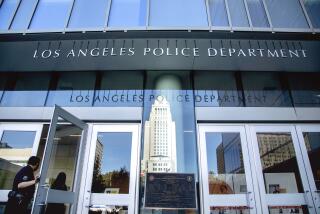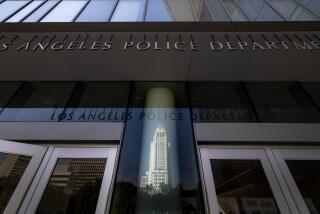LAPD gang units dismantled in some high-crime areas
The Los Angeles Police Department has temporarily dismantled anti-gang units in several of its most crime-plagued neighborhoods because officers in those squads refused to comply with a controversial financial disclosure rule that they view as misguided and invasive.
Police officials have sent the defiant officers back to regular patrol duties and expect that it will take several months to rebuild the gang units with others willing to abide by the policy, which requires officers to periodically submit information regarding their assets and debts. Until then, patrol officers have been saddled with trying to keep up with gang-suppression efforts, a move some gang unit supervisors and community advocates fear could lead to an erosion of expertise and hard-fought gains in reducing gang violence and crime.
“There is definitely a concern that we might start to lose some of the ground we’ve gained,” said Sgt. Randy Goens, a veteran gang supervisor in South Los Angeles who reluctantly plans to complete the disclosure form.
“They have an essential role,” the Rev. Ben “Taco” Owens, a former gang member who is now a prominent gang interventionist, said of the gang officers. “They are familiar with the gangs. They are familiar with the community.... They won’t be around. It’s detrimental.”
The disclosure policy is intended to help identify and deter corruption among the estimated 600 gang and narcotic officers who frequently handle cash, drugs and other contraband. Adopted nearly two years ago, the plan gave officers who were already assigned to the units until the end of March to abide by the new rules or be moved back to regular patrol assignments.
Few narcotics officers objected, but discontent among gang officers has persisted. In recent months, field commanders have grown increasingly worried that the March deadline would not leave them enough time to recruit and train new officers before the onset of summer, when gang crime traditionally spikes. Department officials required officers to declare their intentions in December and gave commanders permission to take action before the end of March.
About three-quarters of the officers agreed to the disclosures, according to LAPD estimates. There were, however, significant holdouts: All but one of the roughly 80 gang officers in the department’s Southeast, 77th, Northeast and Hollenbeck divisions — areas that are home to some of the city’s most violent and active gangs — refused, LAPD officials confirmed. Likewise, all members of the smaller gang teams in Van Nuys and Devonshire said they would not adhere to the policy.
“The bottom line is it isn’t going to be effective and it’s insulting. If we were dirty, we wouldn’t be putting cash into a bank account,” said a veteran gang officer who, like others, asked that his name not be used because of concern that he would be disciplined. “It’s a matter of principle.”
In response, the LAPD captains in charge of those six divisions disbanded the gang units and have begun rebuilding them. Instead of keeping some or all of the veteran gang officers in the units until the end of March to help train new officers, field commanders said they decided it would be better to move them out at once and as early as possible. That decision was made in part to avoid possible tensions between the outgoing and incoming officers.
Other LAPD divisions have lost some portion of their gang officers but managed to keep the units operational.
Police Chief Charlie Beck and other LAPD officials downplayed the possibility that the decision to dismantle the units could lead to a rise in gang activity. With most of the former gang officers now on patrol assignments in the same neighborhoods in which they previously worked, Beck and the others said, there would be sufficient police presence to prevent a crime surge.
“The sky is definitively not falling right now,” said Southeast Division Capt. Phil Tingirides. “This will work temporarily.”
Several senior LAPD officials acknowledged, however, that the decision to disband the gang units inevitably will mean a less intense focus on gang activity and expressed concern that the longer-term risks are significant. With each week that passes, they said, the department will lose ground in the effort to stay on top of the shadowy and always-shifting machinations of the city’s gangs.
“It’s the intelligence gathering, the intimate knowledge of who these gang members are and where they’re located, the upkeep with the informants and the constant stream of information on what the gangs are up to that I’m worried about losing,” said Capt. Dennis Kato, commanding officer of the 77th Area, where more than 15 major gangs are active. “We’re going to be a little slower in catching up to these guys.”
Vic Corella, a recently retired detective who spent years battling gangs in South Los Angeles, noted that although the LAPD keeps tabs on gangs, the gangs are keeping tabs on the LAPD and may exploit the situation.
“They know about deployments,” he said. “They may not be educated. But they are not stupid.”
Corella added that prosecutors often rely on expert testimony of gang officers to win convictions. That testimony, he said, depends largely on whether the officers have up-to-date knowledge on a gang’s activities. A constant presence is required, he said, or “your information gets stale, because the players change so often.”
Like traditional patrol officers, members of the LAPD gang units are required to wear police uniforms and drive the black-and-white LAPD vehicles. Instead of being dispatched on radio calls, however, the gang officers concentrate exclusively on gang crime. They are the only police officers permitted to photograph gang members and access Cal-Gangs, a statewide database that law enforcement agencies use to keep information on gang members.
In recent years the LAPD has had some success pushing down the level of gang-related crimes, and officials say the specialized gang units played a large role in the gains. Gang killings and aggravated assaults by gang members, for example, both fell about 30% between 2007 and last year, according to LAPD statistics.
The task of recruiting officers to join the gang units is a delicate and slow process, several police captains said in interviews. Many of the younger officers now fear they will be ostracized by the departing gang cops for acceding to the requirement.
“I have a number of young officers who have said quietly that they would love to join the unit, but they don’t want to cross what we call the 77th family,” Kato said.
The potential for the disclosure issue to cause schisms among officers has pushed Beck and his command staff to strike a delicate balance. In a show of solidarity with the veteran gang officers, they have submitted the disclosure information themselves and, for months, have been addressing officers at roll-call meetings in an attempt to persuade them to complete the paperwork. At the same time, however, department leaders have made it clear to gang officers who refuse to comply that they cannot pressure others to do the same.
“We’ve been spreading the message that this is a personal decision and the first guy caught causing problems will be gone,” Kato said. “I owe that to officers who are willing to sign.”
The battle over financial disclosures has been long and contentious, dating to the sweeping set of reforms the U.S. Department of Justice forced on the LAPD after the Rampart corruption scandal a decade ago. The union representing rank-and-file officers, which has taken a strong stance against the disclosures, has battled repeatedly with department officials over how to implement the policy.
The department pushed through a disclosure plan in 2009. At the time, Beck’s predecessor, William J. Bratton, admitted that he did not believe that collecting the officers’ information would do anything to stop a rogue cop but said the policy was an unfortunate necessity.
In interviews, several gang officers who refused to comply with the disclosures voiced often-heard complaints about the policy. They dismissed the disclosure forms as ineffective and insulting, and they raised concerns that attorneys could force the department to turn over the financial documents in lawsuits, despite assurances by Beck that the financial information will be kept secure.
Gang officers said it was not worth it to them to stomach the disclosures, particularly because they have little incentive to remain: The department does not offer bonus pay for the hard, dangerous assignment, which often requires large amounts of overtime.
“The department has been told over and over that disclosures were going to be a problem,” said Paul M. Weber, president of Police Protective League, the police union. “They didn’t want to listen. They went ahead simply so they could check off a box and satisfy the Department of Justice. And now it’s created a huge disruption within the organization that isn’t going to do anyone any good.”
More to Read
Start your day right
Sign up for Essential California for news, features and recommendations from the L.A. Times and beyond in your inbox six days a week.
You may occasionally receive promotional content from the Los Angeles Times.








